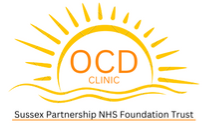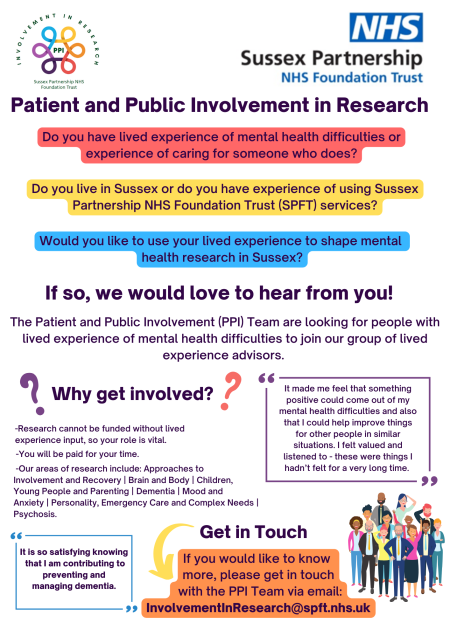Get involved in research

Feedback is important to us so that we know how we can improve and develop the clinic. We get feedback from our lived experience group and once people have finished treatment in the clinic.
Research is needed to help us better understand OCD so that we can continue to develop and provide evidence-based treatments. We really value lived experience, and believe it is important to involve this through coproduction and consolation. If you would like to use your experience of living with, or supporting someone with OCD to shape future research, the clinic, and the resources we produce, please see the last drop-down.
Since opening in 2013, the clinic has helped hundreds of people experiencing symptoms of OCD.
A story from an individual describing how their CBT therapist supported them through the OCD Clinic
I referred myself for a second course of CBT with Health in Mind after an initial course with a different therapist which unfortunately I did not find to be very beneficial. From the very first session with my new therapist, I knew that this course of CBT was going to be completely different.
She instantly put me at ease with her professional, yet kind, caring and empathetic persona. She introduced herself and made it clear that this therapy was a partnership and we would be going on the journey together. Straight away I felt supported and felt a connection. She took the time to let me talk and to get to know me. I felt completely listened to and that I always had her full attention (this was something I continued to feel throughout every session of the course). She recognised that I needed time to build up my understanding of OCD and how it had taken hold of my life. She also knew I needed time to build some tools and skills to use (for example, the vicious flower, theory A/B, responsibility pie, values, ACT) before embarking on any ‘behavioural experiments’. I really appreciated this as it built my confidence and gave me a real purpose for carrying out behavioural experiments and ultimately overcoming the OCD.
Every week, my therapist was so professional, ensuring the session followed a clear structure which made me feel really safe and reassured. In the session, we revisited the session before/ home learning, set goals together and then reviewed at the end. My therapist also made sure she recorded notes when I wanted her to and sent them to me promptly, along with some really helpful links to reading/ resources. A particularly wonderful resource she recommend and helpfully referred to in our sessions was ‘Break Free From OCD’ which I will continue to use to in time to come.
I felt that my therapist made the therapy truly personalised for me. I felt the pace of each session was just right. She was kind and gentle, refocusing things if I went off on tangents, never dismissing things I had to say but instead, acknowledging them and then bringing them in at appropriate times which helped me make sense of things. During our behavioural experiments she was so patient with me but she was also insightful and assertive enough to encourage me to take things a bit more quickly when she knew it was in my interest to. She was also always ready to do the experiment with me which I found hugely supportive and reassuring. It was extremely emotional and I can only describe the moment as feeling like an enormous weight had been lifted and that my therapist was giving me my life back.
Whilst I know I am not fully cured of OCD, the progress I have made with my therapists support has been huge and I know I am so much further along in my journey. I have learnt so much from her and I know that I now have the skills and tools to use to continue my journey alone.
From an individual who was supported through the OCD Clinic'Treatment for OCD was challenging however my therapist was confident, friendly and professional and helped me work through my goals and challenge ingrained unhelpful thoughts and beliefs. By no means is the journey over but it has been a breakthrough for me to be able to talk about this for the first time, with others, and this has had a positive impact on my life. It feels scary when your sessions come to an end and I think a follow up session could be offered E.g. 6 - 8 weeks after treatment, to bridge that gap and help with accountability. Many thanks to this service, we're lucky to have it on the NHS.'
A story from Penelope, who was supported through the OCD clinic"I have suffered from OCD since a very young age. I cannot remember a time that I had not had intrusive thoughts and had to ‘do things’ to stop bad things from happening. Last year I was unable to leave the house for several months. I found each day highly distressing and honestly, unbearable, so I reached out for help. I was offered ERP therapy, which I had never heard of before. I hoped ERP may help a little and even a little bit of help would have been amazing. It is now months down the line and I am at the end of therapy. I cannot express enough how life changing ERP therapy has been for me. My journey was filled with highs and lows, sometimes the process was extremely tough, but I am so glad I stuck with it, as it was worth every minute. I can finally breathe and live my life, as OCD is no longer in control, I am."
Below are the results from our patient experience questionnaire. We asked people who have been through our clinic to give feedback on their experience receiving treatment.
- 89.4% of people who filled out a feedback questionnaire for the OCD Clinic felt that they were listened to all of the time
- 100% of respondents reported that they would recommend the OCD Clinic to a friend
- 45% of respondents said there was nothing the clinic should do to improve
- Time with the clinic was labelled as 'life changing', 'invaluable' and 'confidence building'
- Anxiety of meeting people in person dissipated by use of online platforms for sessions
- People using the clinic felt involved in picking the tasks to complete between sessions
- Group therapy allowed for 'OCD sufferers to help each other'.

We work hard to make sure that patient and public involvement (PPI) is embedded within all of our research, and are always looking for people with lived experience of mental health difficulties to join our Lived Experience Advisory Panels (LEAP).
By sharing your experiences, you will help to make our research more relevant and improve the quality of treatment and care. We believe that if you ask people who have used or will be using the services/treatments you are testing, you will get a better result. You will be invited to meetings which are relaxed and friendly and we’ll ask your opinion on how a research study should work. For example, we may look at the wording of the information or how we should explain the research study to people or what it is asking people to do. You will be paid £18.66 per hour for your time.
We hold Lived experience advisory panel meetings, where friends and family members with lived experience of OCD get involved with shaping research happening in the clinic, as well as how the clinic functions. Some people get involved with lots of different meetings and pieces of work and others just a little. If you do join us, there is no expectation of you doing more work with us than you are happy to do.
If you are interested in joining the OCD Clinic's Lived Experience Advisory Panel, please email: spft.involvementinresearch@nhs.net